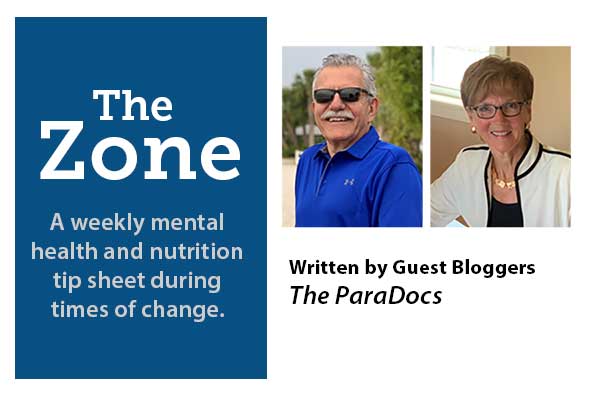Are you worried about burn-out in the new year?
In Volume 37 of this guest series, psychotherapist, Dr. Francis L. Battisti, and nutritionist, Dr. Helen Battisti, explain how we can navigate the future without reaching the end of our ropes.
For over 10 years, they have worked closely with us on aging concerns and have presented many webinars and in-person workshops. Their newsletter, The Zone, is a weekly mental health and nutrition tip sheet during times of change.
How many times have you been in a spirited conversation and have heard the response, “yes, yes, but…”? When we hear this response, it may indicate that whoever uttered this comment, either you or the other person, is experiencing some degree of ambivalence. Ambivalence is defined as a state of mixed feelings or contradictory ideas about something or someone.
As we approach the New Year, it may feel something like sitting in your car at a starting line with one foot on the brake and one on the accelerator. What lies ahead in many ways is uncertain. 2020 brought about monumental world changes that none of us anticipated. In 2021 we will probably continue to experience additional monumental changes. However, we do not know what they are.
While we may be excited to move on to the New Year, we may also be apprehensive, at the same time, for what we do not know. Along with this ambivalence we may be hearing different and conflicting information from those around us and the media. With all this uncertainty whirling around us, it can be difficult to know what to do next.
Returning to our analogy of our car at the starting line, rather than having our eyes focused on the end of the hood, the focus needs to be down the road. Realizing that whatever happens, we can navigate our future when we create a forward momentum based on listening, seeing, reading, engaging with trusted sources, and involving oneself in discourse with others.
- Ambivalence can become a lifestyle if you allow it.
- Inertia is not an option.
- Like the car, with the accelerator and the brake both to the floor, we will burn-out unless forward momentum is taken.
- Be vigilant about our own ambivalence.
- Listen to your gut.
- Read. Listen. Practice discourse.
- “Yes buts”.
- Circular Thinking.
- Not seeing beyond the tip of your nose.
In summary, history teaches us that we will get through, not only this pandemic, but future trials as well. If we stay committed to continuing the quest, with all its’ challenges and opportunities, we will remain hopeful about tomorrows.
Quote of the Week
“The good ole days weren’t always good, and tomorrow ain’t as bad as it seems.”
–Billy Joel

